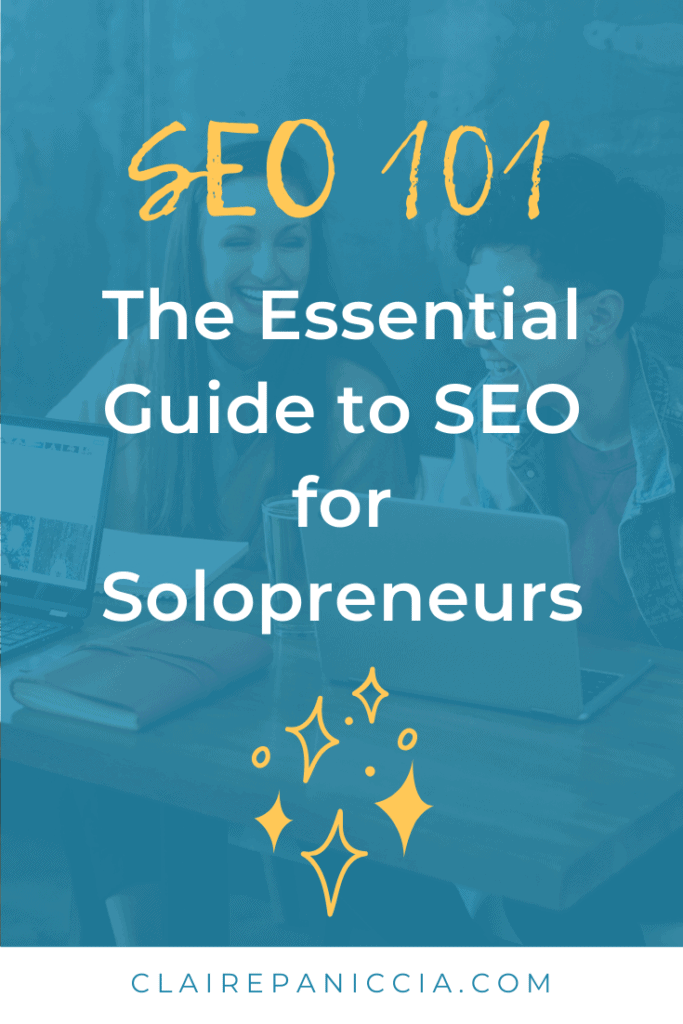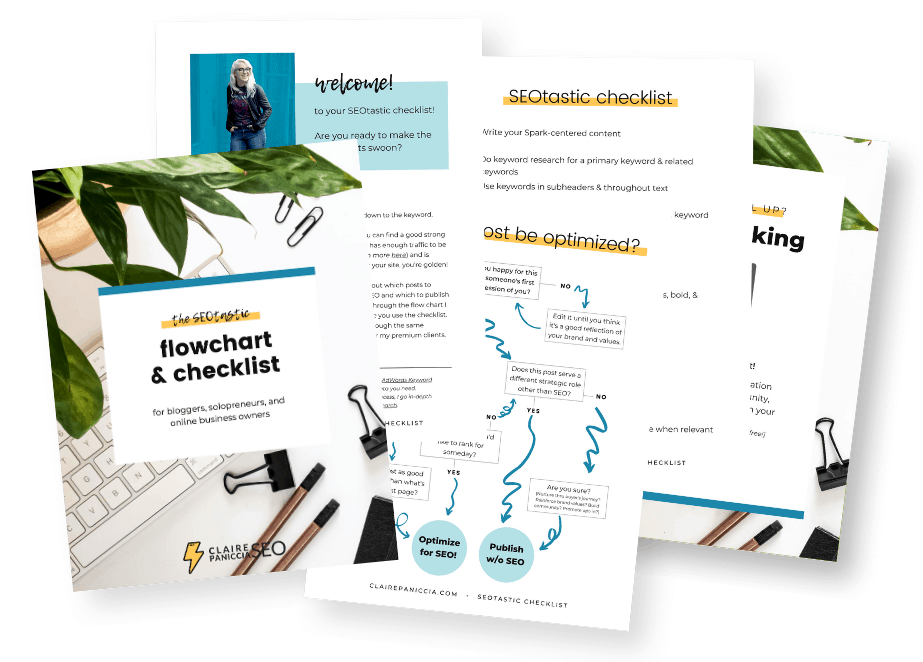SEO can do some seriously awesome things for your business. But only if you know how it works.
There’s a lot of information out there about SEO, but as a freelancer or solopreneur, you probably don’t have time to spend hours and hours going cross-eyed over a million blog posts on a zillion different sites, and then take the brain energy to figure out what’s going to work for you and your business.

So I did it for you.
This guide is SEO 101, with special emphasis on the bits that help you most as a solopreneur, because I got tired of all the “Intro to SEO” posts that focus on the completely wrong things.
What the heck is SEO?
SEO stands for Search Engine Optimization.
It’s all about how you can optimize your website and content so that your business/site can be found in search results on Google for certain search terms.
For example, if you design websites for dentists, it’d be really great for you to be found when someone googles “dental website designs”, right?
There are two primary elements of SEO: on-site SEO and off-site SEO. And then there’s awesome content, which comes into play with both.
So really there are three elements.
How does SEO help solopreneurs?
Being found on the first page of Google for strategic key terms like in the web designer example (known as keywords) does a few different things for solo small online entrepreneurs.
It can drive free organic traffic to your site.
Doing SEO is like investing.
You do the work, maintain it, and then over time, you’ll start to see traffic coming in from Google that you didn’t have before, all because of SEO.
It helps establish your authority.
If you rank on the first page for “how to set up webinar tech”, you’ll probably start to be seen as the go-to person for webinars or tech for entrepreneurs.
Also, the strategies you’ll use to get your business on the first page of Google for that term will also help establish your authority when people find that content by other means, like your social media. So double whammy there.
The results from SEO last longer than results from social media.
Sure, social media is a great strategy to build an audience and promote your business and blog posts.
But social media posts don't have a long lifespan. Facebook posts stay the radar for about 5 hours. Twitter posts only last about 18 minutes! Instagram feed posts typically have a lifespan of 48 hours.
These are great short term ways to promote your business or blog. But none of those will work in the long term to support your business. SEO is a long-term strategy that keeps working over the long-haul.
How SEO works
Google’s ultimate goal is to provide the best possible results for searchers.
This is the most important thing to remember.
When someone does a search on Google, Google wants to give them kickass, super helpful, relevant search results.
So the Googlebots scan the whole web looking for just that, taking a gazillion different things into account with their super top secret algorithm.
Basically, they want sites that:
- Have high authority (and are therefore trustworthy content)
- In-depth content that answers the searcher’s query
- Has a positive user experience
There’s a lot more to it, but that’s the nuts and bolts.
But the real question is: how the heck do the Googlebots know which results meet all these requirements??? They don’t speak Human or see pictures.
So we entrepreneurs have to learn how to speak Robot.
There are a ton of factors in the top secret algorithm, but we SEO pros have worked diligently in our SEO labs to figure out as best we can exactly what you should focus on.
(But don’t forget that Robots don't buy your services or products. Humans do. The key is to write for Humans first, and then make sure Robots can read it too. Not the other way around.)
On-site SEO
Laying the Foundations of Your Site for Robots to Understand It
With on-site SEO, you’re making sure your site is set up with all the little nuts and bolts that the Google bots love, like header tags, page titles, meta description tags, and image alt tags.
You’re also making sure that your content is optimized and your primary keywords are in the right places to be recognized as important by the bots.
The primary goal with all these little bits and pieces in on-site SEO is to indicate to the Robots what the page is about. It's all about making sure your site speaks Robot as well as it speaks Human.
Keyword research is a big thing here. You’ll want to make sure your keyword is in the right places to show our Robot friends what the topic is.
For example:
One of the most important places to put your keyword is in the page title. In search results, that becomes the big bold blue text that people click on.
For a blog post, this might be some version of the headline.
If it's your homepage, you’ll want the page title to be your business name, with a clear keyword of what you do and who you target, like “Copywriter for Business Coaches” or “Social Media for E-commerce”.
Whatever it is, just make sure it's clickable AF.
Off-site SEO
All About Backlinks
Backlinks are just links on other sites that point back to your site.
Earning backlinks is one of the reasons you want to write great content. That way, there’s something valuable for people to link back to. They're unlikely to just link to your homepage for no reason.
Why does Google care about backlinks?
Google cares about backlinks because it indicates that your content is valuable and high-authority.
So the more backlinks you have, the more valuable and high-authority your content seems to the Robots.
Remember that Google’s ultimate goal is to answer the searcher’s question. If other (authoritative) sites are pointing back to your content, they’re basically giving you an endorsement.
Now, not all backlinks are created equal.
Some types of links are more valuable than others, and links from some sites have higher SEO-giving power than others. Some links also require more or less effort to get.
For example:
Some backlink opportunities for freelancers and solopreneurs might be:
- Resource pages on related niche sites
- Industry specific online directories
- Guest posts (and don’t just count on the author bio! Get a link or two in the content if you can!)
- Podcast interviews
- In blog posts from your referral network
Killer Blog Content
All About Content and Why You Need Some
Having awesome, unique content and blog posts on your site helps both your on-site SEO and your off-site SEO.
And BONUS! It does a helluva lot more than that, too.
How Killer Content Helps Your SEO:
- Blog content gives you more pages to do some on-site SEO magic, to include optimized content, and to bring attention to those all-important keywords.
- Awesome content is an opportunity to provide kickass value, so other sites will have a good reason to link to you. It’s very slim chance someone will link to your homepage, unless you did an interview or something. More likely, sites will want to link to an awesome resource you provide.
Other Awesome Things Content Does For You:
- You can give your audience additional value and increase that all-important KLT (know-like-trust). This has nothing to do with SEO, but is still really super important. After all, being a real person and not some faceless corporate mogul is one of the biggest advantages we have as independent solo entrepreneurs. Never forget that content marketing does oodles more than help your SEO. But this is an SEO guide, so we’re gonna focus on that for now.
- It’s a way to nurture and funnel towards your opt-in and grow your email list. Because you're already building KLT, you’re working your way towards people being willing to mini-commit to your brand by giving you their email address. And from there, well the world of email marketing is your oyster.
- Content marketing is a great way to sell without the icky “hard sell”. I don’t know about you, but I’m sick of hard sell strategies and advice out there, with all the psychological tricks and manipulations and blech-y marketing. Content marketing is literally the opposite of that and it works.
So There You Have It…
…the basics of SEO broken down just for online solopreneurs.
If you want to go more in-depth on this kind of SEO info, I've got a few resources that might be helpful.
For more of the tech side of things with WordPress, check out this blog post: 9 Easy Mistakes You're Making On WordPress That Are Killing Your SEO
For a list of things to do when you optimize your blog posts: SEO for Blogs: 9 Simple Things You Need to Do to Every Post
For a deep dive in writing for SEO: The Ultimate Guide to Writing for SEO: Everything You Need to Know
Free SEOtastic Flowchart & Checklist




